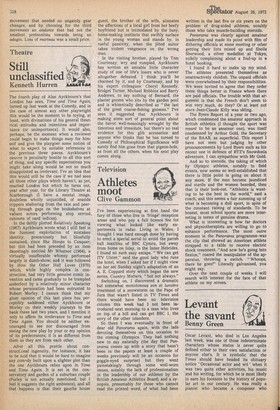Theatre
Still unclassified
Kenneth Hurren
The fourth play of Alan Ayckbourn's that London has seen, Time and Time Again, turned up last week at the Comedy, and in the case of almost any other playwright this would be the moment to be toying, at least, with divinations of his general theatrical attitudes and intentions and importance (or unimportance). It would also, perhaps, be the moment when a reviewer could begin to make things easy for himself and give the playgoer some notion of what to expect by suitable references to the previous three pieces. Ayckbourn's oeuvre is peculiarly hostile to all this sort of thing, and any specific expectations you might take along would be not so much disappointed as irrelevant. I've an idea that this would still be the case if we had seen all those other plays which haven't, as yet, reached London but which he turns out, year after year, for the Library Theatre at Scarborough (I have a mental image, doubtless wholly unjustified, of seaside trippers sheltering from the rain and peering through gaps on the bookshelves at valiant actors performing atop serried cabinets of card indices).
In the deftly plotted Relatively Speaking (1967) Ayckbourn wrote what I still feel is the funniest exploitation of mistaken identity, precariously but blissfully sustained, since She Stoops to Conquer; but this had been preceded by an item dauntingly entitled Mr Whatnot (1964), a virtually insufferable whimsy performed largely in dumb-show; and it was followed by How the Other Half Loves (1970) which, while highly complex in construction, had very little genuine comic invention and came gradually to be trampled underfoot by a relatively minor character whose personation had been entrusted to Robert Morley. I cannot think that my glum opinion of this last piece has perceptibly saddened either Ayckbourn or Morley on their weekly journeys to the bank these last two years, and I mention it only to affirm its irrelevance to Time and Time Again. You should be neither encouraged to see nor discouraged from seeing the new play by your or my opinion of its predecessors; it is as different from them as they are from each other.
After all this prattle about construct:onal ingenuity, for instance, it has to be said that it would be hard to imagine any corric:dy built upon a slighter plot than the one Ayckbourn relies upon in Time and Time Again. It is set in the conservatory and garden of a suburban couple (Purley is not actually mentioned, but I feel it suggests the right ambience), and all that happens is that their gauche house guest, the brother of the wife, alienates the affections of a local girl from her beefy boyfriend but is intimidated by the busy, home-making instincts that swiftly surface in the young woman and stands by, in rueful passivity, when the jilted suitor takes violent vengeance on the wrong man.
' In the visiting brother, played by Tom Courtenay, wry and rumpled, Ayckbourn has written an amiable little character study of one of life's losers who is never altogether defeated. I think you'll be charmed by it, and by Courtenay, and by his expert colleagues: Cheryl Kennedy, Bridget Turner, Michael Robbins and Barry Andrews, to say nothing of Bernard, the plaster gnome who sits by the garden pool and is whimsically described as "the last of the great coarse-fishing gnomes." I've seen it suggested that Ayckbourn is making some sort of general point about the havoc well-meaningly wrought by the timorous and irresolute, but there's no real evidence for this glib accusation and anyone who thinks that he has turned to Comedy of Philosophical Significance will surely find him gone from that pigeon-hole, as from all the others, when his next play comes along.










































 Previous page
Previous page